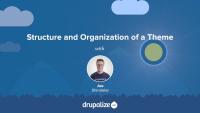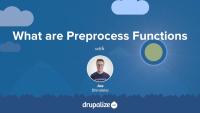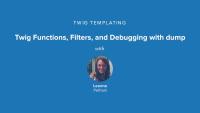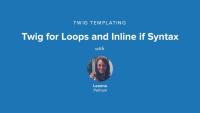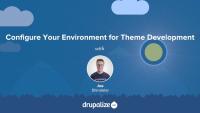Acquia Certified Drupal Developer Exam
What will you learn
- What to study for the Acquia Certified Developer exam
- Concepts you should know as a Drupal developer
Overview
The Acquia Drupal 10 Certified Developer exam and the Acquia Drupal 9 Certified Developer exam are part of Acquia's Drupal certification program. The exams consist of 60 scenario-based questions about fundamental web development concepts, Drupal site building, theming, and back-end development. We've gathered together a concise list of the Drupalize.Me tutorials, and other resources, that will help you prepare for both the Acquia's Certified Drupal 9 and 10 Developer exams
Drupal 9/10
1. Fundamental web development concepts
In this section of the exam you need to demonstrate knowledge of HTML and CSS, PHP, JavaScript and jQuery programming concepts, along with being able to demonstrate the use of Git for version control.
1.1 Demonstrate knowledge of HTML and CSS
HTML and CSS are the foundational languages for how browsers display web pages.
1.2 Identify JavaScript and jQuery programming concepts
JavaScript (JS) is an interpreted programming language that is widely used on the web to control web page behavior and interactivity.
1.3 Demonstrate the use of Git for version control
The Git version control system can help you keep track of changes in your codebase and make sure you don't unintentionally lose work.
2. Site building
For the Site Building portion of the exam, you will need to demonstrate the ability to:
- Create and configure content types with appropriate fields and field settings for building basic data structures
- Configure display modes for building custom form and view modes for core entities
- Create and use taxonomy vocabularies and terms for classification and organization of content
- Configure block types, manage blocks library and configure block layouts
- Build main and alternative navigation systems by using menus
- Create and configure views for building content list pages, blocks, and feeds
- Use configuration management capabilities for exporting site configurations
- Build multilingual websites using core multilingual capabilities
- Demonstrate ability to build RESTful web applications using core web services capabilities
Drupal User Guide
Guide2.1 Demonstrate ability to create and configure Content Types with appropriate fields and field settings for building basic data structures
Overview of content entities and fields.
2.2 Demonstrate ability to configure Display Modes for building custom form and view modes for core entities
Overview of forms and widgets.
How to edit a content entry form.
Overview of view modes and field formatters.
How to make content items more presentable.
2.3 Demonstrate ability to create and use Taxonomy vocabularies and terms for classification and organization of content
Overview of taxonomy and how it can be used to categorize content in a website.
How to create a taxonomy vocabulary and add it as a field to a content type.
How to add a reference field that connects two content types.
2.4 Demonstrate ability to configure Block types, manage Blocks library and configure Block layouts
2.5 Demonstrate ability to build main and alternative navigation systems by using Menus
Overview of the menu concept and menus automatically created with the core Standard installation profile.
How to add a page to the navigation.
How to reorder links in a menu.
2.6 Demonstrate ability to create and configure Views for building content list pages, blocks, and feeds
2.7 Demonstrate ability to use Configuration Management capabilities for exporting site configurations
2.8 Demonstrate ability to build multilingual websites using core multilingual capabilities
2.9 Demonstrate ability to build RESTful web applications using core Web Services capabilities
3. Front-end development (theming)
In this section you will be given a scenario, and demonstrate your ability to create a custom theme or sub-theme. You will need knowledge of theming concepts and the ability to build or override PHP templates for defining layout content, use theme functions for overriding custom output, and write template preprocess functions for overriding custom output. You will also need to demonstrate the ability to use the Twig template system.
3.1 Given a scenario, demonstrate ability to create a custom theme or sub-theme
Custom themes in Drupal must be configured to inherit settings, templates, and other assets from a parent theme. Which base theme you use is configurable. This allows theme developers to use a different set of markup as the starting point for their theme, organize various theme assets into a more maintainable structure, and more. All of this is made possible because of how Drupal's theme layer uses a chain of inheritance when assembling all the parts of a theme.
Base themes are also a powerful way to encapsulate standards and best practices into a reusable code base. You'll find dozens of contributed base themes on Drupal.org that can serve as a great starting point, especially if you're planning to work with an existing design framework like Bootstrap or Susy Grids. Or if you want to leverage modern JavaScript bundling without setting up Webpack on your own.
In this tutorial we'll:
- Learn what base themes and subthemes are
- Look at a few examples of template inheritance and how that works
- Discuss some use cases for theme inheritance
By the end of this tutorial you'll know how to declare the base theme that your theme builds upon.
Drupal core comes with a few base themes: Stable, Stable 9, Classy, and Stark. Each one has a different intended use case. And all of them are useful as a reference for building your own themes.
In this tutorial we'll:
- Learn what each of the base themes included in Drupal core is intended to be used for
- Compare the output from the base themes with a focus on Stable and Classy
By the end of this tutorial you'll be able to explain the use case for each of the base themes included with Drupal core and make an informed decision about which, if any, to use when creating your own custom themes.
Make your theme a subtheme of a base theme, allowing it to inherit all the base theme's templates and other properties. When creating Drupal themes it is common to use the Classy theme provided with Drupal core as a base theme to jumpstart your development.
In this tutorial we'll learn how to:
- Use the
base themekey in our theme's THEMENAME.info.yml file - Make our Ice Cream theme inherit from the Classy theme, or any other theme
By the end of this tutorial you should be able to tell Drupal that your theme is a child of another theme and should inherit all of the parent theme's features.
3.2 Demonstrate knowledge of theming concepts
Themes are the part of Drupal that you, and anyone else visiting your Drupal powered application, see when they view any page in their browser. You can think of a theme as a layer, kind of like a screen, that exists between your Drupal content and the users of your site. Whenever a page is requested Drupal does the work of assembling the content to display into structured data which is then handed off to the presentation layer to determine how to visually represent the data provided.
Drupal themes are created by front-end developer. Frequently referred to as themers, or theme developers. Themes consist of standard web assets like CSS, JavaScript, and images, combined with Drupal-specific templates for generating HTML markup, and YAML files for telling Drupal about the file and features that make up each individual theme.
In this tutorial we'll:
- Explain what a Drupal theme is.
- Explain the role of a Drupal themer in the process of building a Drupal site.
- Get a high level overview of the types of files/code that themes are made of.
By the end of this tutorial you should be able to explain what a Drupal theme is, and the kind of work a Drupal theme developer will be expected to do.
Each theme is a collection of files that define a presentation layer for Drupal. While only a THEMENAME.info.yml file is required, most themes will contain other files as well. Some are Drupal-specific, and need to follow a strict naming convention and be placed in the appropriate place for Drupal to find them. Others are standard front-end web assets like CSS, JavaScript, and image files that can be placed anywhere within the theme's code.
In this tutorial we'll learn about:
- The various types of files you can expect to find in a theme directory
- Where in the Drupal code base your theme directory should live
- Keeping the directory and all the files within organized
By the end of this tutorial you should be able to explain where a Drupal theme should be placed in a project's code base, and the types of files one can expect to find in a theme.
Drupal comes with all of its caching features enabled by default. This improves response time, but can be frustrating for themers as it makes it harder to preview the changes you make to template files.
In this tutorial we'll look at:
- Why these features are enabled by default
- How the theme layer leverages Drupal's caches
- Why you should learn to disable them when doing development
Themes define the regions that are available for site administrators to place blocks in, creating a layout framework within which the components that compose a page can be placed. As a theme developer you'll need to determine what regions are necessary to accommodate your design's layout, while also ensuring it'll work with the way Drupal uses blocks to place content onto the page. Deciding what regions to create requires knowledge of how Drupal works and a clear vision of the design you're trying to achieve.
In this tutorial we'll:
- Explain what regions are and how they relate to themes
- Describe how regions are handled internally within Drupal
- Demonstrate things to keep in mind when planning the regions for your custom theme
By the end of this tutorial you should be able to describe what a region is, explain how Drupal themes use regions to place content, and get started dissecting your own designs into regions.
Template files are responsible for the HTML markup of every page generated by Drupal. Any file ending with the .html.twig extension is a template file. These files are composed of standard HTML markup as well as tokens used by the Twig template engine to represent dynamic content that will be substituted into the HTML markup when the template is used. As a theme developer, you'll work with this a lot.
In this tutorial we’re going to learn about:
- What template files are, and how they fit into the big picture of creating a theme
- How template files are used in order to allow theme developers to modify the HTML markup output by Drupal
- Naming conventions for, and specificity of, template files
Twig is the default template engine for Drupal. If you want to make changes to the markup that Drupal outputs you're going to need to know at least some Twig. In this tutorial, we will outline the role that Twig now plays in Drupal, how Twig impacts the theming experience, and where to find additional resources for learning Twig.
At the end of this lesson, you'll be able to:
- Describe the role that Twig plays in creating Drupal themes
- Explain how Twig impacts the theming experience in Drupal
- Locate additional resources for learning Twig
Every theme can contain an optional THEMENAME.theme file. This file contains additional business logic written in PHP and is primarily used for manipulation of the variables available for a template file, and suggesting alternative candidate template file names. Themes can also use this file to implement some, but not all, of the hooks invoked by Drupal modules.
In this tutorial we'll learn:
- The use case for THEMENAME.theme files, and where to find them
- The different types of functions and hooks you can implement in a THEMENAME.theme file
By the end of this tutorial you should be able to know how to start adding PHP logic to your custom theme.
Preprocess functions allow Drupal themes to manipulate the variables that are used in Twig template files by using PHP functions to preprocess data before it is exposed to each template. All of the dynamic content available to theme developers within a Twig template file is exposed through a preprocess function. Understanding how preprocess functions work, and the role they play, is important for both module developers and theme developers.
In this tutorial we'll learn:
- What preprocess functions are and how they work
- The use case for preprocess functions
- The order of execution for preprocess functions
By the end of this tutorial you should be able to explain what preprocess functions are and the role they play in a Drupal theme.
An asset library is a bundle of CSS and/or JavaScript files that work together to provide a style and functionality for a specific component. They are frequently used to isolate the functionality and styling of a specific component, like the tabs displayed at the top of each node, into a reusable library. If you want to include CSS and/or JavaScript in your Drupal theme or module you'll need to declare an asset library that tells Drupal about the existence, and location, of those files. And then attach that library to a page, or specific element, so that it gets loaded when needed.
In this tutorial we’ll:
- Define what an asset library is.
- Explain why asset libraries are used to include JavaScript and CSS files.
- Look at some example asset library definitions.
By the end of this tutorial you should be able to define what asset libraries are, and when you'll need to create one.
3.3 Demonstrate ability to use Twig syntax
Twig is a template engine for PHP, which is the language used in Drupal. Twig can be used to design templates in generic PHP applications as well as Drupal themes.
To read a Twig template file, you'll need to recognize Twig's syntax delimiters. Twig has three syntax delimiters: one for printing out variables, another for performing actions or logic, and lastly, one for comments, also used for docblocks.
In this tutorial we'll:
- Explore each of Twig's 3 syntax delimiters.
- Show examples of each from Drupal's core template files.
By the end of this tutorial you should be able to recognize each of Twig's syntax delimiters and understand what the engine will do when it encounters them.
Twig has a special syntax for accessing array keys and objects, also known in Twig as variable attributes. In this tutorial, we'll cover the period or dot (.) operator to access a variable attribute, as well as subscript or square-bracket syntax, useful for when the key of the array contains special characters, like a dash (-) or pound sign (#). We'll also look at the logic Twig uses to find the matching attribute in an array or object.
Many of the variables that you have access to inside of a Twig template file are arrays. For example a list of values for a multi-value field, or a set of error messages generated when validating a form submission. In order to work with arrays in Twig you'll need to understand how for loops work. This is essential information for anyone creating Drupal themes.
In this tutorial we'll cover:
- Using the
fortag to iterate over an array - Using the
loopvariable inside of aforloop for additional context
In Twig, you can modify variables using functions or filters. Twig has a bunch of built-in functions and filters. Drupal extends Twig to provide a few handy Drupal-specific functions and filters as well.
In this tutorial, we'll look at:
- What are functions and filters?
- How to use functions and filters in Twig
- Detailed information about the Drupal-specific functions and filters and their use case
The ability to loop over an array of values in a Twig template and print out each value individually is an important skill for anyone developing themes for Drupal. Common scenarios include: loop over the values of a multiple value field; iterate through a list of links; and display error messages at the top of forms. This tutorial will provide an example of using the Twig for function to iterate over a list, or a subset of a list.
In this tutorial we'll cover how to:
- Output values from a multi-value field in an unordered list.
- Add first and last classes to the first and last items in a list by using the Twig
loopvariable.
By the end of this tutorial you should be able to print out the values of an array as individual list items using a loop in Twig.
Do you cringe at the sight of untidy whitespace or (gasp) no whitespace at all when you View Source? Learn how to tame whitespace in Twig template files in this tutorial. By the end of this lesson, you will be able to recognize how Twig controls whitespace and how you can do the same in your Drupal template files.
In order to ensure that all user interface strings in your application can be translated using Drupal's localization system, any text you add to templates needs to use either the t filter or the {% trans %} tag. Anyone creating themes or editing template files associated with a theme or a module should know how to use these two utilities.
In this tutorial we'll look at:
- How to use the
tfilter and{% trans %}tag in a Twig template - The differences between the two, and how to determine which one to use
- How to translate strings assigned to variables in preprocess functions using the PHP
t()function
Theme developers often need to add or remove classes and other attributes from an HTML tag. Template files handle this with a special Attributes object that contains the attributes and their values, as well as a handful of powerful methods to help manage these attributes.
In this tutorial we’ll cover:
- Adding/removing classes from elements in a Twig template
- The attributes object
- Examples of common tasks using various helper methods on the attributes object
Before you can create a path or link to another page on your site, you'll need to know the route (unless there is already a variable available for the URL you need). Finding a route can be a tricky task unless you have the right tools. In this tutorial, we'll show how tools like Webprofiler, Drush, and Grep can be used to get route information for a page, so that you can use functions that need a route as a function parameter.
In this tutorial we'll:
- Learn how to determine the route or path of an internal page.
3.4 Demonstrate ability to build or override Twig templates for defining layout content
This tutorial demonstrates how to locate the template file that is currently being used to render an element and override it in your own theme. This is an important skill for anyone who wants to make changes to Drupal's default HTML markup.
In this tutorial we'll:
- Override the node.html.twig template in our theme
- Make changes to the markup
- Create a content-type-specific template override like node--CONTENT_TYPE.html.twig
By the end of this tutorial you should be able to modify the HTML markup used to display a node, or any other element of the page generated using a template file.
If you want to make changes to the HTML markup of any element on the page you need to first figure out the theme hook or base name of the template file used to generate it. This information is required to override the template in your custom theme.
There are other situations in which knowing the theme hook name of a template file is useful. Including determining which preprocess function affects a template, and which template theme hook suggestions can be used.
In this tutorial we'll learn:
- How to figure out the theme hook name for any template
By the end of this tutorial you should be able to use the output from Twig's debugging mode to determine the theme hook name of any template file.
Making Drupal fast by default implies having caching layers and CSS and JavaScript aggregation utilities enabled out-of-the-box. As a theme developer this can be annoying, because you must clear these various caches in order to preview any changes. In addition, inspecting variables with debugging tools often produces PHP errors. We'll make some recommendations for PHP settings on your local environment that can prevent these errors from happening so often.
By the end of this tutorial, you should be able to:
- Set up your local Drupal site for theme development
- Prepare your local development environment for working on and debugging themes
Knowing how to inspect the variables available within a template file enables you to discover all of the dynamic content in a Twig file, not just that which is already being used.
In this tutorial, we'll learn how to use {{ dump() }}, kint(), vardumper(), and XDebug to inspect variables in a template file.
3.5 Demonstrate ability to write template preprocess functions for overriding custom output
Preprocess functions are specially-named PHP functions that allow themes and modules to modify the variables passed to a Twig template file. They are commonly used by themes to alter existing variables before they are passed to the relevant template files. For example; Changing the makeup of render array so that it renders an <ol> list instead of a <ul> list. Or appending data to the label of a node depending on custom logic.
In this tutorial we'll:
- Define a new preprocess function in our theme's .theme file
- Use the preprocess functions to modify the content of an existing variable before it's used in Twig
By the end of this tutorial you should be able to define new preprocess functions in a theme (or module) that manipulate the variables for a specific Twig template file.
Preprocess functions are specially-named functions that can be used to add new variables to a Twig template file. They are commonly used by themes to add new variables based on custom PHP logic and simplify accessing the data contained in complex entity structures. For example: adding a variable to all node.html.twig template files that contains the combined content a couple of specific fields under a meaningful name like {{ call_to_action }}. Modules use preprocess functions to expose the dynamic data they manage to Twig template files, or to alter data provided by another module based on custom logic.
In this tutorial we'll learn how to:
- Use PHP to perform some complex logic in our theme.
- Store the resulting calculation in a variable.
- Make that variable available to a Twig template file.
Example use cases for adding variables with preprocess functions include:
- Anytime calculating the value to output in a template requires logic more complex than an if/else statement.
- Anytime the desired value requires additional string manipulation beyond what can be easily accomplished using an existing Twig filter or function.
By the end of this tutorial you should be able to expose new variables to a Twig template file by defining a preprocess function in either a module or a theme.
When determining which template file to use to theme an element, Drupal uses the list of theme hook suggestions to look for the best match. This allows for fine-grained control over how things appear based on dynamic state and contextual information in your application. The list of theme hook suggestions varies for each base template, so we need a way to figure out our options.
In this tutorial we'll look at:
- How to determine the list of valid theme hook suggestions for any template file
- How theme hook suggestions are added by modules and themes
By the end of this tutorial you should be able to explain how theme hook suggestions are added, and determine the valid suggestions for any template file.
Themes and modules can alter the list of theme hook suggestions in order to add new ones, remove existing ones, or reorder the list. This powerful feature allows for the definition of custom logic in your application that can tell Drupal to use different templates based on your own unique needs. You might for example; use a different page template for authenticated users, or a custom block template for someone's birthday.
In this tutorial we'll cover:
- Adding new theme hook suggestions from a theme using
hook_theme_suggestions_HOOK_alter() - Altering the list of theme hook suggestions
- Removing theme hook suggestions
- Reordering the list of theme hook suggestions
4. Back-end development (coding)
The final section of the exam will have you demonstrate your ability to develop custom modules using Drupal APIs and Drupal's Database Abstraction Layer for managing tables and CRUD operations on data. You will need to have the ability to debug code and troubleshoot site problems, analyze and resolve site performance and security issues arising from site configuration and custom code, along with a general ability to write code using Drupal Coding Standards. In addition to the following main Developer Guide and the specific topics listed here, you should be generally familiar with all of the topics listed in our Module Development section.
Develop Drupal Sites
Guide4.1 Demonstrate ability to write code using core and Object-Oriented PHP
Object-oriented PHP utilizes classes and objects to organize code into reusable chunks. This approach helps us organize complex applications, such as Drupal, into modular code called classes that can be reused across the entire system.
Services are objects that encapsulate the code for performing specific tasks in a reusable and decoupled way.
Dependency injection is a design pattern commonly used in object-oriented software architectures in order to support Inversion of Control.
4.2 Demonstrate ability to develop Custom Modules using Drupal API for extending Drupal functionality
YAML, which stands for YAML Ain't Markup Language, is a human-readable data serialization format that's been widely adopted in a variety of use cases in Drupal. Anyone wanting to write modules, or themes, for Drupal will need to understand YAML syntax. Even site builders are likely to encounter YAML at least in passing as YAML is the data-serialization format of choice for Drupal's configuration management system. Good thing it's pretty easy to learn even with the most basic of programming backgrounds.
This tutorial will look at the YAML data format and provide examples of how to write and read YAML. Starting with an introduction to the language's syntax and some of the strengths of YAML. Then looking at the difference between scalar data types like strings and integers, and collection data types like lists and associative arrays.
Since YAML in the Drupal world is read into PHP and ultimately becomes a PHP data structure that we can use in our own code we'll also look at how the YAML we write in a .yml file is represented in PHP data types. To do this we'll use the YAML Sandbox module that provides a handy textarea into which we can type YAML and have it parsed into PHP data structures.
Learning objectives
- Explain what YAML is and its strengths as a data serialization format
- Create scalar key/value pairs in YAML
- Create lists, and associative arrays using YAML collections
- Understand how the YAML you write is represented in PHP
Tips
- In Drupal, use the .yml extension and not .yaml
- Ensure your code editing application is configured to use spaces (preferably 2 spaces, as per Drupal coding standards), not the tab character when the TAB key is pressed. If you have tab characters in a YAML file within a Drupal environment, a fatal PHP error will be thrown and you'll see a White Screen of Death (WSOD).
- Copy and paste from an existing YAML file to ensure the formatting is correct, and edit from there.
Additional resources
- http://www.yaml.org
- YAML Sandbox module
- Find other tutorials and external resources related to YAML on our YAML topic page (Drupalize.Me)
In this tutorial, we'll examine one the first files you'll need in order to create a Drupal module: the info file. Each module is required to have a MODULE.info.yml file to help Drupal identify that a bundle of code is a unique module. This specially-formatted YAML file tells Drupal about the module and provides other useful metadata. In this tutorial, we'll walk through both required and optional information you put in a module's info file.
If you've ever built or administered a Drupal site, the permissions page (/admin/people/permissions) is probably quite familiar.
If you're new to module development, you may wonder where these permissions come from, and how you can specify your own permissions. In this tutorial we'll answer those questions.
First, we'll look at how to define permissions from within a custom module. We'll examine techniques that enable you to provide specific (static) permissions as well as dynamic permissions, which depend on another piece of data, such as the name of a content type. By the end of this tutorial you will understand how to add both static and dynamic permissions to a custom module.
Drupal provides module developers several different methods for creating the different types of links we see on a typical page. In this tutorial we'll see how these different types of links relate to each other, and when you might want to make use of them.

In this tutorial we'll provide an overview of the following concepts:
- Menu links
- Action links
- Local tasks
- Contextual links
4.3 Demonstrate ability to store and retrieve data using code
Drupal provides a standard, secured method for module developers to add forms to a Drupal website. Learn how to use the Form API to build, validate, and submit a custom form.
Entities are the fundamental building blocks that make up any Drupal site. Having a good understanding of the Entity system is an important part of ensuring the data model of your Drupal site is set up properly.
Entity CRUD (Create, Read, Update, and Delete) operations are handled via the EntityTypeManager service.
In this tutorial we'll:
- Learn how to use the
EntityTypeManagerservice to perform basic CRUD operations with examples you can copy/paste - Access both property and field values of an entity
- Update entities by setting new field values and then saving the object
By the end of this tutorial, you'll be able to understand Entity CRUD operations and be well on your way to becoming comfortable with accessing and manipulating entity values in code.
4.4 Demonstrate ability to work with other essential APIs
Hooks allow modules to alter and extend the behavior of Drupal core, or another module. As a Drupal developer, understanding how to implement and invoke hooks is essential.
Plugins are one of the ways that module developers can write code that extends Drupal. The Drupal Plugin API allows a module to provide functionality in an extensible, object-oriented way.
Events are one of the ways that module developers can alter or extend Drupal without modifying existing code.
The Render API consists of a standard format for describing data using structured arrays and a process for converting those arrays into the HTML a user sees when interacting with a Drupal site.
Fields are the building blocks of Drupal's powerful content modeling system. The Field API allows for the development of custom field types to suit almost any data display and collection needs.
Caching in Drupal is controlled by Drupal's Cache API which is used to store any type of data on a permanent or temporary basis. Some types of data tend to take a long time to compute, but utilizing the Cache API in your module can help your site load data more quickly.
Use the Configuration API to access configuration data stored by a module, provide default configuration, create settings forms, and other tasks such as overriding settings for a local environment.
4.5 Demonstrate ability to write code using Drupal Coding Standards
Coding standards provide a set of rules for how your code should be formatted, and best practice guidelines for naming conventions and the location of files.
4.6 Demonstrate ability to analyze and resolve site performance issues arising from site configuration or custom code
The Render API is capable of detecting poorly-cacheable (highly dynamic) parts of a page and rendering them later using a process called auto-placeholdering. This works by using #lazy_builder callbacks to lazy load certain very dynamic subtrees of a render array. The place in the array where that very dynamic content would appear is first assigned a placeholder. At the very last moment it is replaced with the actual content.
This allows Drupal to do things like cache the overall page in the Dynamic Page Cache despite parts of the page being too dynamic to be worth caching. It also allows the Render API to assemble a page using cache fragments combined with non-cacheable elements.
In this tutorial we'll:
- Discuss what lazy builders are and how they work in conjunction with placeholders to speed up the rendering pipeline
- Cover some common gotchas for lazy builders
- Look at some example code that implements a lazy builder callback
By the end of this tutorial, you should know how and when to use the #lazy_builder property of a render array and how Drupal uses placeholders to increase the cacheability of content and speed up the rendering process.
The individual items that make up the content of a page impact the cacheability of that page. In order for Drupal's cache and external caches to better understand how the content varies on a page, module developers use the #cache render element property. The #cache property defines cacheability metadata for individual elements in a render array.
Additionally, these Render API elements can become fairly complex. The calculation of what the final HTML output should look like often involves looking up content in the database, checking multiple conditions, maybe querying an external API, and various other tasks. This can cause turning a render array into HTML to become quite expensive. In order to speed up this process, the Render API will cache the generated HTML for each element and reuse it on future requests whenever possible -- but only if you tell it to do so.
In this tutorial, we'll look at:
- How render caching impacts the performance of a page
- Defining the cacheability of an item with cache tags, cache contexts, and cache max-age
- Examples of using the
#cacheproperty in a render array
By the end of this tutorial you should know how, and when, to use the #cache property when defining render arrays.
Debugging is the practice of troubleshooting an application through the use of tools and processes in order to find and fix bugs, or better understand the underlying code.
Performance and scalability determine how fast your application can serve a page and to how many users at a time.
4.7 Demonstrate ability to analyze and resolve security issues arising from site configuration or custom code
Keeping a Drupal site secure requires monitoring security announcements, performing regular updates, and knowing how to properly use Drupal’s APIs to write secure code.
4.8 Demonstrate ability to write a test using the core testing framework.
Test Custom Code
GuideGeneral knowledge
PHP: Hypertext Preprocessor (PHP) is a popular interpreted programming language that is especially suited for web development. Drupal core and all contributed modules are written in PHP.
Drush is a command line interface that enables you to interact with your Drupal site without clicking around the graphical user interface (GUI).









